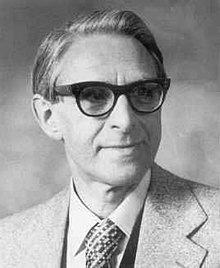Klaus Roth
Klaus Roth | |
|---|---|
 | |
| Born | Klaus Friedrich Roth 29 October 1925 |
| Died | 10 November 2015 (aged 90) Inverness, Scotland |
| Citizenship | Germany United Kingdom |
| Alma mater | Peterhouse, Cambridge |
| Known for | diophantine approximation discrepancy theory |
| Awards | Sylvester Medal (1991) LMS De Morgan Medal (1983) Fellow of the Royal Society (1960) Fields Medal (1958) |
| Scientific career | |
| Fields | Mathematics |
| Institutions | University College London Imperial College London |
| Doctoral advisor | Theodor Estermann |
Klaus Friedrich Roth (29 October 1925 – 10 November 2015) was a German-born British mathematician known for work on diophantine approximation, the large sieve, and irregularities of distribution.
Early life
He was born in Breslau, Prussia, but was raised and educated in the UK, where his family settled in 1933. He was pupil at St Paul's School in London from 1939 to 1943 and then attended Cambridge University, graduating from Peterhouse, Cambridge in 1945. In 1946 he began research at University College London, under the supervision of Theodor Estermann.
Career
In 1952, Roth proved that subsets of the integers of positive density must contain infinitely many arithmetic progressions of length three, thus establishing the first non-trivial case of what is now known as Szemerédi's theorem. His definitive result, now known usually as the Thue–Siegel–Roth theorem, but also just Roth's theorem, dates from 1955, when he was a lecturer at University College London. He was awarded a Fields Medal in 1958 on the strength of it. He became a professor at University College London in 1961, and moved to a chair at Imperial College London in 1966, a position he retained until official retirement in 1988. He then remained at Imperial College as Visiting Professor until 1996. He died in 2015 at the age of 90.[1]
The Imperial College Department of Mathematics instituted the Roth Doctoral Fellowship in his honour.
Publications
- Roth, Klaus Friedrich (1955), "Rational approximations to algebraic numbers", Mathematika, 2: 1–20, 168, doi:10.1112/S0025579300000644, ISSN 0025-5793, MR 0072182
- Halberstam, Heini; Roth, Klaus Friedrich (1983) [1966], Sequences (2nd ed.), Berlin, New York: Springer-Verlag, ISBN 978-0-387-90801-4, MR 0210679
References
- ^ "Klaus Roth". Chalkdust. 2015-11-10. Retrieved 2015-11-10.
- Davenport, H. (1960), "The work of K. F. Roth", Proc. Internat. Congress Math. 1958, Cambridge University Press, pp. lvii–lx, Zbl 0119.24901
Further reading
- Chen, W. W. L.; Gowers, W. T.; Halberstam, H.; Schmidt, W. M.; Vaughan, R. C., eds. (2009), "Klaus Roth at 80", Analytic number theory. Essays in honour of Klaus Roth on the occasion of his 80th birthday, Cambridge: Cambridge University Press, ISBN 978-0-521-51538-2, Zbl 1155.11004
External links
- O'Connor, John J.; Robertson, Edmund F., "Klaus Roth", MacTutor History of Mathematics Archive, University of St Andrews
- 1925 births
- 2015 deaths
- 20th-century English mathematicians
- 21st-century English mathematicians
- Academics of Imperial College London
- Alumni of Peterhouse, Cambridge
- Fellows of the Royal Society
- Fields Medalists
- German emigrants to England
- Number theorists
- People educated at St Paul's School, London
- People from Wrocław
- People from the Province of Lower Silesia
- Jewish emigrants from Nazi Germany to the United Kingdom
- English people of German-Jewish descent
